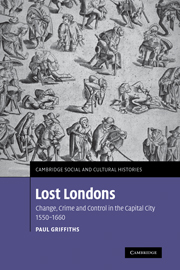Book contents
- Frontmatter
- Contents
- Maps and tables
- Abbreviations
- Preface
- Introduction: Rhetorics and records
- Part I Change
- Part II Crime
- Part III Control
- 6 Court days
- 7 Bodies
- 8 Policing: people and policy
- 9 Policing: night battles
- 10 Policing: process and prosecution
- 11 Policing: knowledge
- Conclusion
- Appendix
- Bibliography
- Index
7 - Bodies
Published online by Cambridge University Press: 15 December 2009
- Frontmatter
- Contents
- Maps and tables
- Abbreviations
- Preface
- Introduction: Rhetorics and records
- Part I Change
- Part II Crime
- Part III Control
- 6 Court days
- 7 Bodies
- 8 Policing: people and policy
- 9 Policing: night battles
- 10 Policing: process and prosecution
- 11 Policing: knowledge
- Conclusion
- Appendix
- Bibliography
- Index
Summary
Bodies
There were scores of bodies in Bridewell at any one time, working, suffering, and resting. Bodily discipline was the order of the day there from sunrise to sunset. Inmates were put to work in the hope that they might change for the better and meanwhile spin or make pins, buttons, brushes, or tennis balls. Work was tedious, dirty, sweaty, and sticky in stuffy hemphouses or outside shifting sand or cleaning ditches. Vagrants were not coupled with good hygiene. Dirt stuck to them like a second skin, magistrates thought, and their clothes were caked with filth and sweat. A deputy was told to bring a ‘rogue’ back to Bridewell ‘in cleane clothes’. Prisoners had soap to scrub themselves and their clothes were washed every four days or so to get rid of lice. An oven was made ‘to destroy’ the ‘vermine of the prisoners’ in 1632. More softly, bodies were nourished, healed, and cleaned with running water.
Bodies were also bashed and battered. Work was bruising and there was a crop of accidents. A surgeon got 6/8d ‘for curing a womans head hurt at the mill’ in 1628, and a scale of fees ‘for sudden cures happening within the house’ was drawn up in 1629. A lot of blood was spilled after whips lashed backs. The sound of the lash and groans of flogged prisoners that continued long into the night were acoustic cues to toe the line.
- Type
- Chapter
- Information
- Lost LondonsChange, Crime, and Control in the Capital City, 1550–1660, pp. 253 - 290Publisher: Cambridge University PressPrint publication year: 2008

